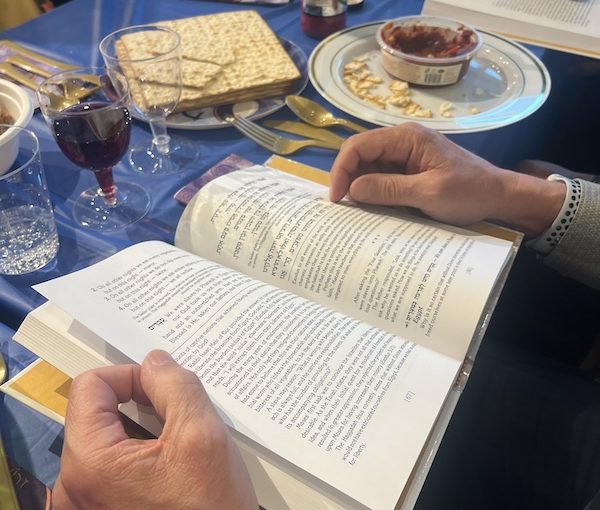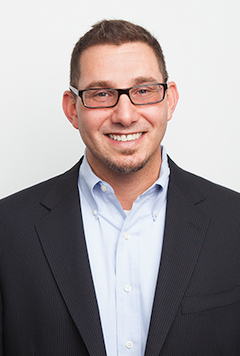The Feb. 22 panel discussion at Congregation Schara Tzedeck featured, left to right, moderator Dr. Auby Axler and panelists Rabbi Andrew Rosenblatt, Dr. Jenny Melamed, David Berner and Rebecca Denham. (photo by Zach Sagorin)
Approximately 5,000 Jews in the local Jewish community need support around addiction, according to Jewish Addiction Community Services Vancouver.
JACS offers various support programs for those battling addiction, and their families and friends, and organizes events for community education and awareness. On the evening of Feb. 22, at Congregation Schara Tzedeck, the agency partnered with Schara Tzedeck and the Jewish Federation of Greater Vancouver for a panel discussion on the fentanyl crisis and addiction in the Jewish community in general. Participating panelists were Rabbi Andrew Rosenblatt, addiction medical specialist Dr. Jenny Melamed, addiction therapist David Berner and director of services at JACS, Rebecca Denham; the moderator was Dr. Auby Axler.
“JACS Vancouver is a new agency trying to tackle a taboo and shame-filled topic that can ignite passionate responses and strong resistance,” explained Denham in an email. It is committed to supporting community needs relating to substance use, and values a diversity of perspectives on addiction treatment.
At the panel discussion, Rosenblatt spoke about some of the community concerns and the internal conflicts that some people experience when trying to determine the best approaches to addiction support.
Melamed, an addiction doctor who has been treating people with opioid addiction for 15 years, said, “People have been dying from heroin, people have been dying from all drugs…. There are many drugs out there that are as dangerous. Alcohol is one of the most dangerous drugs out there, 90% of the trauma seen in the [emergency room] after midnight is from alcohol. A heroin addict is a calm, sedated person who is nodding off in a corner, he’s not violent; he’s a danger to himself, and he’s not a danger to anybody else.”
She explained, “Addiction is a … disease situated in the primitive part of the brain…. The addiction goes and sits there and it says, ‘if you do not use me, you will die, you need me.’ This is where the team comes in…. We’ve got the ability to say, ‘I’m not going to listen to you anymore.’ But the power to overcome that is what is needed and it is strong and it requires meetings, it requires therapy, it requires a team, it really is a village to keep somebody sober in the long term.”
About 40 people attended the discussion and Melamed commented, “When you look at how big the Jewish community is and how small the attendance is here tonight … we live with our heads in the sand and we don’t realize how many of us have family members who are in addiction.
“We need to remove the stigma related to addiction. When we tried to get somebody in recovery to talk tonight, we couldn’t find anybody in the Jewish community who would come and stand up, because we put that big addiction sticker on people’s forehead. But we all know that it can happen to anybody. Yes, there is an enormous genetic component, a 40% genetic component when it comes to addiction, but there is trauma. Sexual abuse happens in any religion. Everything happens across the board.”
While the Downtown Eastside is often considered the centre of addiction and drug use, Melamed said this is not the reality. “The people on the DTES make up maybe one to five percent of the drug-using population. Seventy-five percent of people using drugs are what we call functional … nobody knows what is going on out there. If you can afford your heroin habit, then you’re OK until you overdose and it takes you over to the other side.”
Berner, founder and executive director of a residential treatment centre for drug addicts and alcoholics, has conducted almost 11,000 therapy groups.
“Addictions are coping mechanisms…. I’ve never met someone in addiction who hasn’t had a terrible upbringing, who hasn’t had severe trauma, serious trauma,” Berner said. “I’ve rarely met anyone who has addiction who hasn’t suffered physical or sexual abuse, or emotional-psychological abuse, or financial abuse.”
Berner posed the rhetorical question, “Can you change? No.” But, he said, “You can change the things you do, including picking up [drugs or alcohol].”
He said, “Every week I give a lecture, every Tuesday morning, and then do group therapy. One of the things I say week in and week out is, I don’t want to hear about your substance.”
Berner also commented on the government’s spending on addiction services in Vancouver.
“We’ve got harm reduction, that’s it!” he said. “And then prevention, treatment and the law are not only ignored officially … they are officially denigrated by the health department, by the ministry of health, and anyone that can make a decision.”
In response to an audience question – “How does the word recreational fit in with the level of risk that’s involved in drugs?” – Melamed responded, “I think you have to replace the word recreational now with Russian roulette because that’s the word we’re using. There is no safe use.”
“Even with marijuana?” asked another audience member.
Melamed said she knows, based on urine samples she has taken, that “some of the marijuana is laced with fentanyl.”
However, a man in the audience, identifying himself as a federal prosecutor who works with the police on narcotics, countered that assertion. “My understanding, after looking at various police files on where this has been reported, [is that] marijuana laced with fentanyl … is anecdotal. It is from people who have overdosed in a non-fatal manner and have reported it to hospital authorities, doctors, police officers, [saying] ‘all I used was marijuana,’ and this is to avoid, in my understanding, the stigma of being labeled a hard drug user…. There has been no actual seizure by police in B.C. of marijuana laced with fentanyl.”
However, the prosecutor added, “We see cocaine laced with fentanyl, we see a lot of heroin laced with fentanyl, we see methamphetamine laced with fentanyl.”
With Purim approaching, Rosenblatt noted, “Drinking on Purim happens a lot, especially in the Orthodox Jewish community, because there is a statement in the Talmud – a person is obligated to drink on Purim until they don’t know the difference between cursed be Haman, who is the villain of the story, and blessed by Mordechai, who is the hero.”
He said, “Maimonides says the way you should be happy on Purim is by spending most of your effort feeding the poor on Purim. Why? You would think that maybe Maimonides was democratic and would say something very nice like the poor deserve a holiday, too.… That’s not what Maimonides says at all. Maimonides says that there is no greater joy in the world than helping another person.”
“JACS was born out of a necessity and I think it is important to remind you that JACS is here to support you,” said Denham in wrapping up the event. “If a question doesn’t get answered tonight or if an issue gets triggered for you, reach out to us and we will support you just as the community has supported us. We wouldn’t be here today without the kind accepting spirit that runs deep throughout this community. From the support of the rabbinical leaders, professionals, individuals, family foundations, the support of the Federation … all of whom continue to strengthen JACS services … we are bringing this much-needed discussion away from shame and into a supportive light.”
To learn more about JACS Vancouver, Denham can be reached at rdenham@jacsvancouver.com.
Zach Sagorin is a Vancouver freelance writer.




